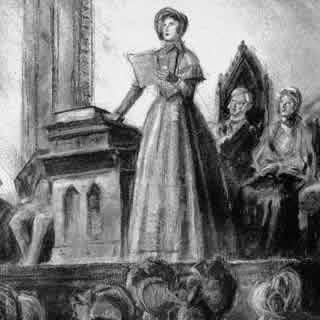 |
| Click Pic to read "The Declaration of Sentiments" |
10 - He has monopolized nearly all the profitable employments, and from those she is permitted to follow, she receives but a scanty remuneration.
11 - He closes against her all the avenues to wealth and distinction, which he considers most honorable to himself. As a teacher of theology, medicine, or law, she is not known.
12 - He has denied her the facilities for obtaining a thorough education - all colleges being closed against her.
.
---
.To show that I am not a horrible cretin of a misogynist, I'm going to grant Elizabeth Cady Stanton her point number nine. I wholeheartedly agree that a woman who owns property while single should be allowed a voice if she is being taxed upon the property. This was the basis for men having suffrage too, and indeed, this is how women slowly on began getting more access to the vote - especially since women who were widows owning substantial property holdings left behind by their husbands paid hefty taxes indeed. Most of society thought this reasonable as well, which is why women in such situations were soon allowed to vote by proxy - they could send a man in their stead to deliver their vote. (Women were sometimes given the vote in various states or municipalities long before 1919). Back in those days, voting was quite often violent, with union leaders trying to intimidate voters and riots erupting at the polls. So, instead of sending these women into the dragon's lair, they arranged for such property-holding women to vote by proxy rather than in person.
 Touché, Elizabeth Cady Stanton.
Touché, Elizabeth Cady Stanton.However, I'd like to remind her that Sparta fell because, according to Aristotle, its faulty inheritance laws resulted in women owning 2/5 of the land - so, there's what we think is fair, and there's what works. The two need balance. I suspect women not holding property outside of marriage, as addressed in point six, would suffice to keep this in check in our civilization because it would keep the number much smaller than that which Aristotle claimed as the cause of Sparta's plummeting birthrates. (How much of the population were widows and single women back in 1848? Not that much.) Keep in mind this is a legal right, not an "unalienable" one, which has been established earlier. Legal rights are about making society "function."
(Read More Here)